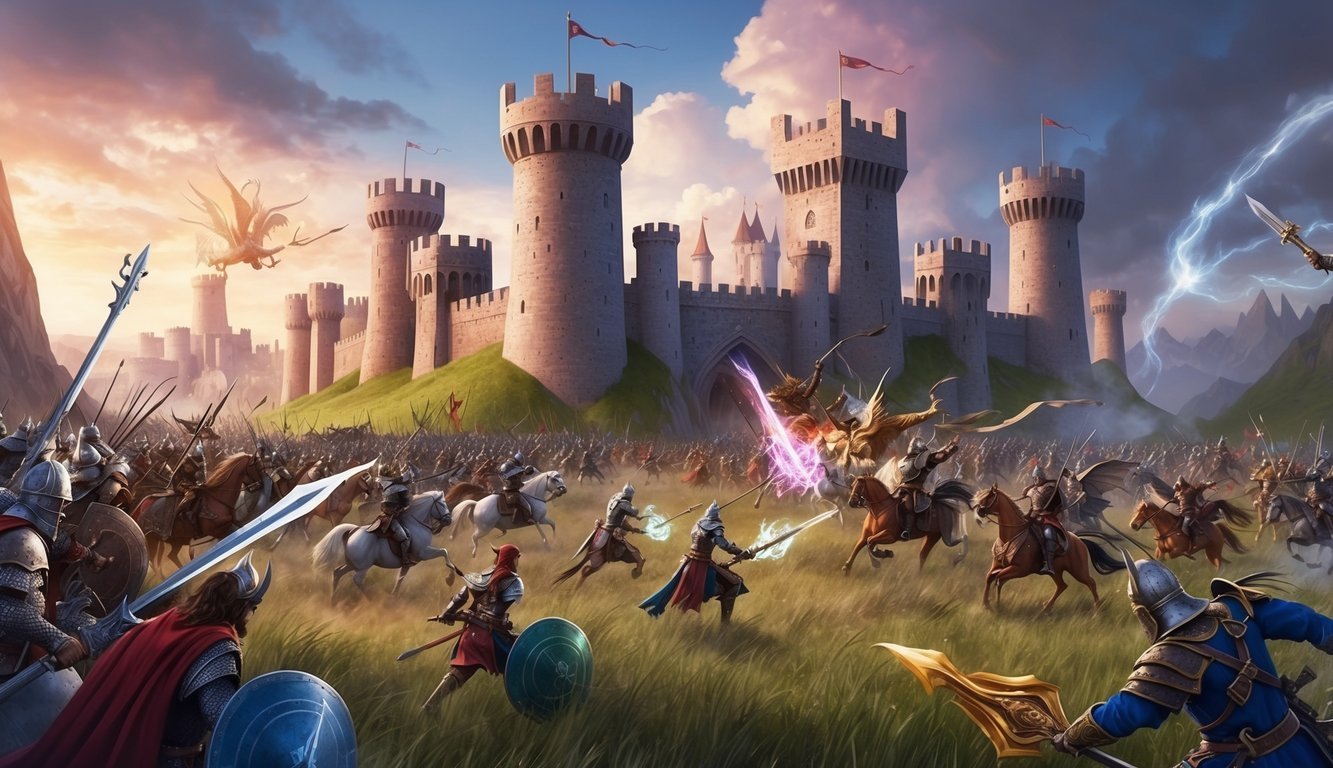Fantasy war games transport you to magical realms where epic battles unfold between mythical armies.
These games blend strategy, imagination, and rich lore to create immersive experiences.
Whether you prefer tabletop miniatures or digital platforms, there’s a fantasy war game to suit your tastes.
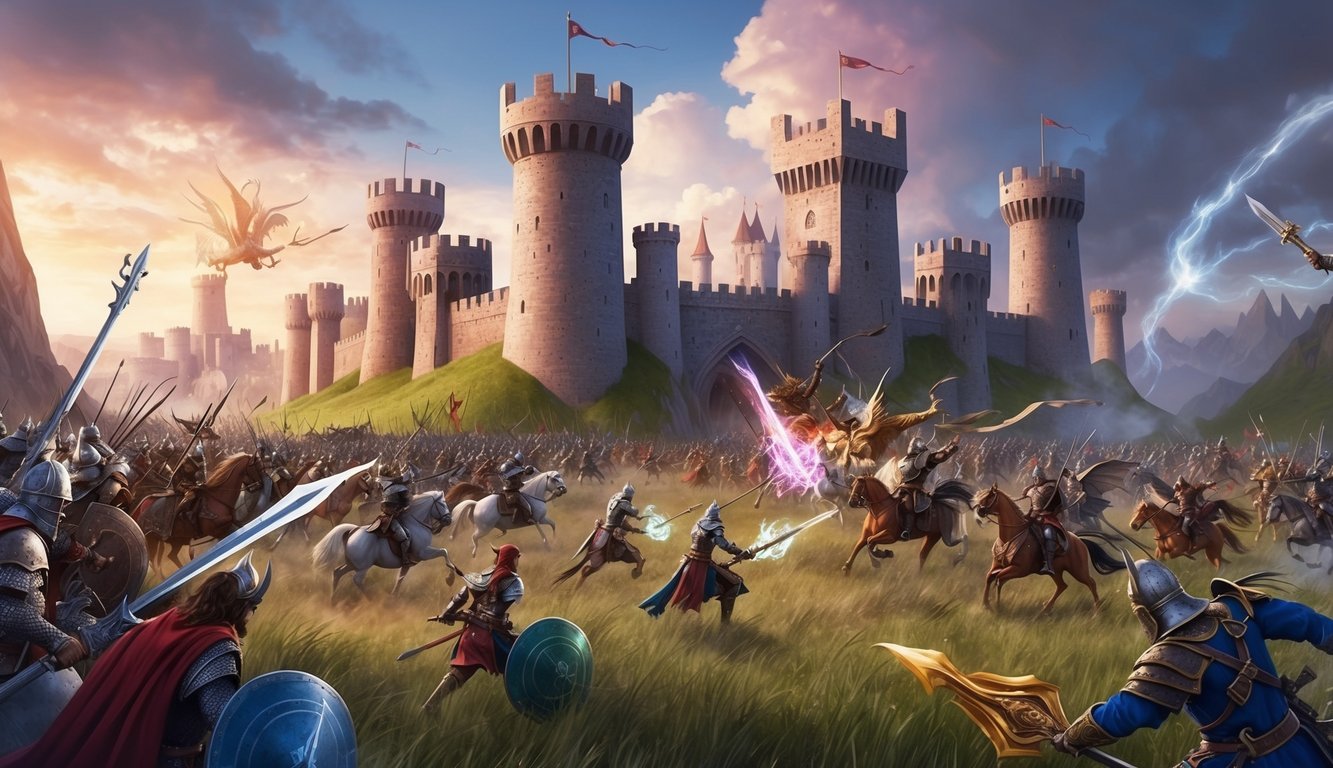
Fantasy war games offer diverse settings, from high fantasy with elves and dragons to darker worlds filled with undead hordes. You’ll command armies, cast spells, and make tactical decisions that shape the fate of entire kingdoms.
The genre includes both turn-based and real-time strategy games, allowing you to choose your preferred pace of play.
Popular titles in this genre range from classics like Warhammer to newer entries like Age of Wonders.
Many games feature extensive army customization, letting you build unique forces that reflect your playstyle.
As you explore these fantastical battlefields, you’ll discover intricate storylines and face challenging opponents, both AI and human.
Origin and Evolution of Fantasy War Games
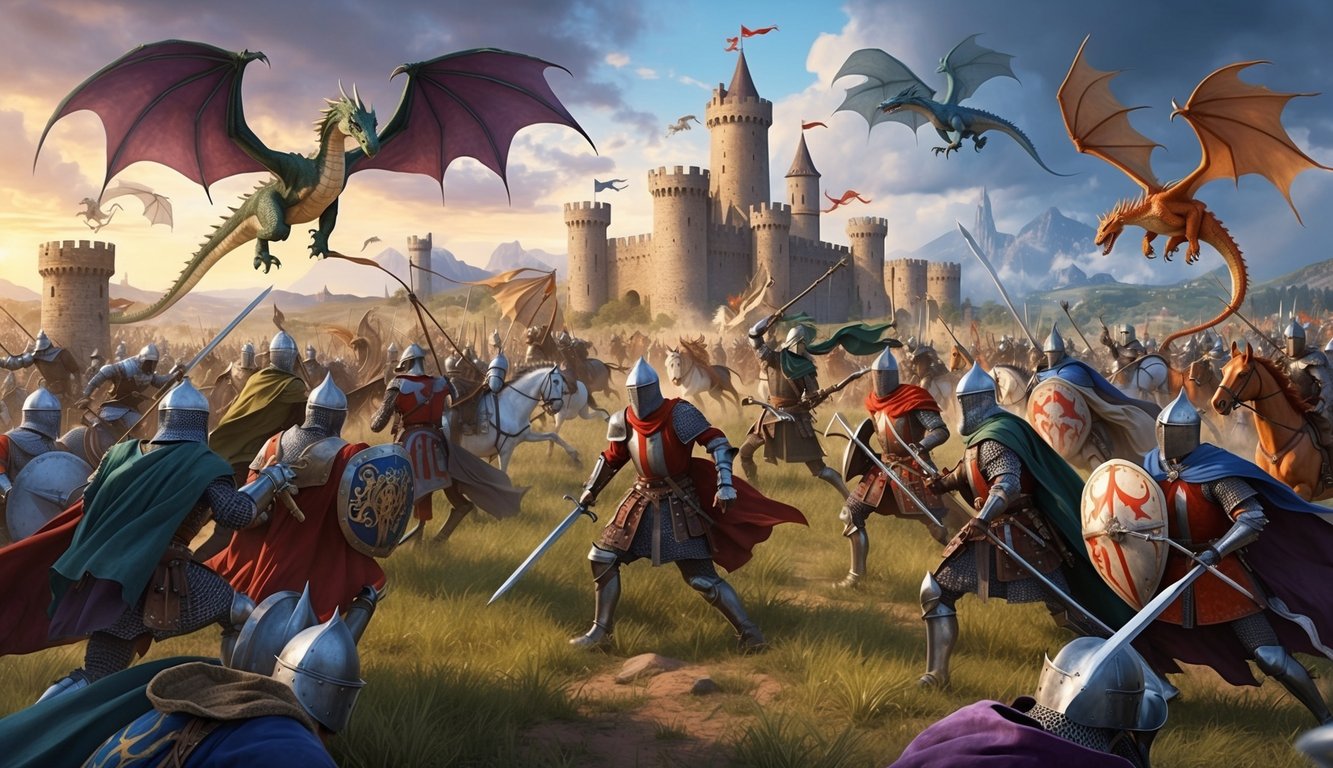
Fantasy war games have come a long way since their humble beginnings.
They’ve transformed from tabletop miniatures to sprawling digital universes, captivating players with rich lore and epic battles.
From Tabletop to Digital: A Transition
You might remember the early days of fantasy war games, with miniature figures on meticulously painted terrain.
These tabletop games laid the foundation for the genre.
Companies like Games Workshop pioneered this format with Warhammer Fantasy Battle in 1983.
As technology advanced, you saw these games make the leap to digital platforms.
PC games like “Total War: Warhammer” brought the tabletop experience to life on your screen.
This transition opened up new possibilities for complex battle simulations and immersive storytelling.
Influential Titles: Warhammer Games and Beyond
Warhammer Fantasy has been a cornerstone of the genre.
You’ve probably encountered its rich lore, featuring epic conflicts between diverse factions.
Games Workshop’s creation inspired countless other titles and spinoffs.
Beyond Warhammer, you’ve seen an explosion of fantasy war games.
Titles like “Heroes of Might and Magic” and “Age of Wonders” have carved out their own niches.
These games blend strategy, role-playing elements, and deep world-building.
Digital platforms have allowed for massive multiplayer battles and constantly evolving game worlds.
You can now command vast armies in real-time, something unimaginable in the early days of tabletop gaming.
Defining Fantasy War Games
Fantasy war games blend strategic combat with magical realms and mythical creatures.
You’ll command armies, cast spells, and engage in epic battles across enchanted landscapes.
These games offer a unique mix of tactical thinking and imaginative worldbuilding.
Core Mechanics and Gameplay
In fantasy war games, you’ll typically control units on a grid-based map.
Your goal? Outmaneuver and defeat your opponent’s forces.
You’ll move troops, attack enemies, and use special abilities each turn.
Resources like gold or mana are often crucial for recruiting new units or casting powerful spells.
Turn-based tactics are common, giving you time to plan your moves carefully.
Some games use real-time strategy instead, testing your quick thinking and multitasking skills.
Unit types vary widely, from sword-wielding knights to fire-breathing dragons.
Combat usually involves dice rolls or numerical calculations to determine outcomes.
Terrain features like forests or mountains can affect movement and battles, adding an extra layer of strategy to your decisions.
Genre Crossovers and Evolutions
Fantasy war games have evolved to include elements from other genres.
You might find role-playing aspects, where your units gain experience and level up over time.
Some games incorporate deck-building mechanics, letting you customize your army with collectible cards.
Tactical gameplay has become more complex, with factors like unit facing and flanking bonuses.
You’ll need to consider not just where to place your troops, but how they’re oriented on the battlefield.
Digital versions have expanded possibilities, offering intricate animations and complex AI opponents.
Online multiplayer modes let you test your skills against players worldwide.
Some games even blend fantasy with historical or sci-fi elements, creating unique hybrid settings for your conquests.
Major Franchises
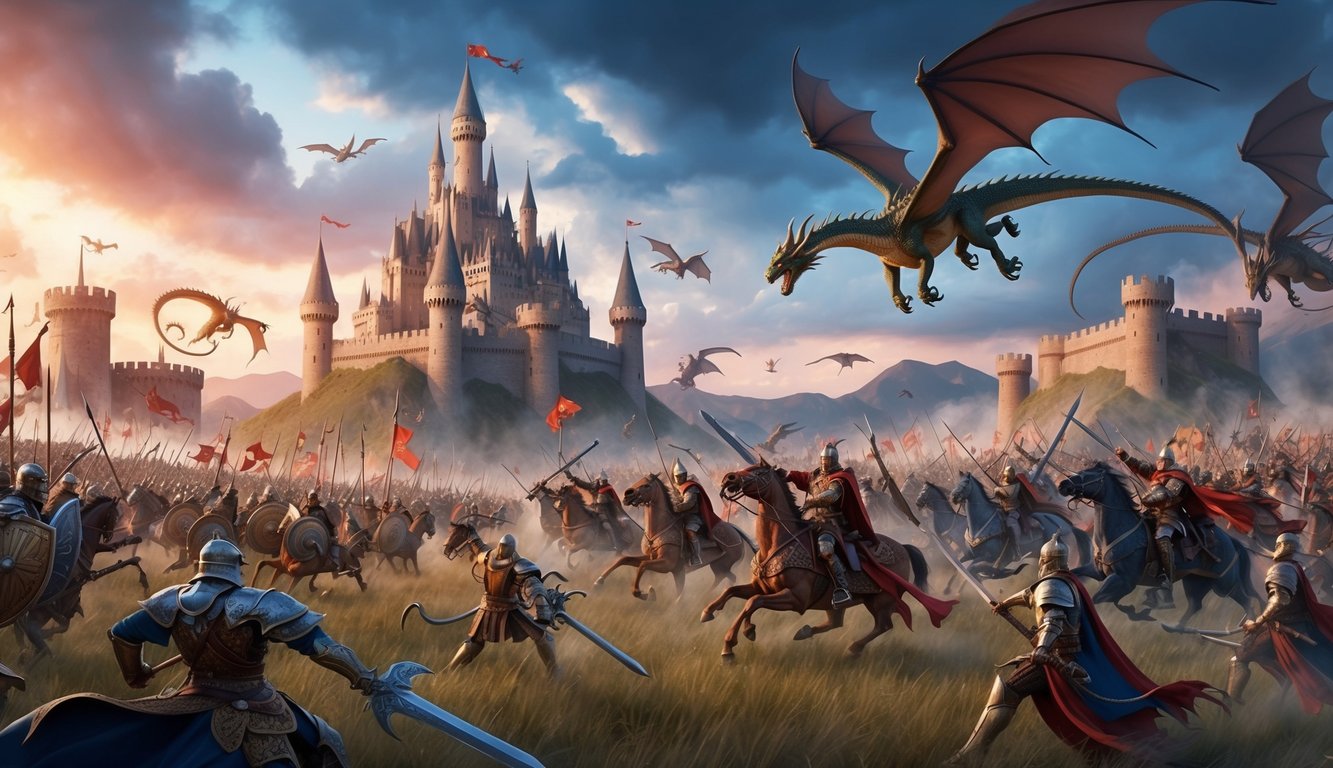
Fantasy war games have been dominated by a few iconic series that have captured players’ imaginations.
These franchises have built rich universes and refined gameplay mechanics that keep fans coming back for more.
Warhammer: A Colossal Universe
You’ll find it hard to ignore the massive impact of Warhammer on fantasy war gaming.
Games Workshop’s sprawling universe encompasses both Warhammer Fantasy and Warhammer 40,000, offering you countless hours of tabletop and digital warfare.
Age of Sigmar revitalized the fantasy side, bringing new life to the Old World with its dynamic rules and stunning miniatures.
You can dive into epic battles with diverse factions like the Stormcast Eternals or the sinister forces of Chaos.
Warhammer 40,000 takes the conflict to a grim, dark future where you’ll command armies of Space Marines, Orks, or Tyranids in brutal galactic warfare.
The depth of lore and tactical gameplay has made it a cornerstone of the genre.
Influence of Total War Series in the Genre
When you think of strategy games blending fantasy and historical warfare, Total War: Warhammer likely comes to mind.
This series has revolutionized how you experience large-scale fantasy battles.
Total War: Warhammer 2 expanded on its predecessor, offering you a massive campaign map and diverse factions to command.
You’ll lead armies of High Elves, Lizardmen, and other fantastical races in turn-based strategy and real-time tactical battles.
Total War: Warhammer 3 pushes the boundaries even further.
You can now venture into the Realms of Chaos, commanding demonic legions or defending against their incursions.
The game’s grand campaigns let you rewrite the fate of the Warhammer world.
World Building and Lore

Fantasy war games transport you to richly imagined realms filled with magic and mythology.
These intricate worlds provide the backdrop for epic conflicts and heroic quests.
Creating Believable Mythical Worlds
When crafting a fantasy setting, you’ll want to establish consistent rules for magic.
Define how spells work and their limitations.
Develop unique races and creatures with distinct cultures and histories.
Map out your world’s geography, from sprawling kingdoms to treacherous wilderness.
Consider the political landscape.
Who holds power? What alliances and rivalries exist? Weave in legends and prophecies to add depth.
Think about how magic shapes society and technology.
Remember to include small details that bring the world to life.
Local customs, popular foods, and everyday items all contribute to immersion.
Notable Fantasy Realms
Game of Thrones immerses you in the gritty, political world of Westeros.
You’ll encounter complex characters vying for the Iron Throne amidst dragon fire and ancient magic.
Lustria, from Warhammer Fantasy, presents a jungle continent teeming with dinosaurs and lizardmen.
You’ll explore Mayan-inspired ruins and face off against Skaven ratmen.
Realms of Ruin offers a post-apocalyptic fantasy setting.
You’ll navigate a world where magic has corrupted the land, creating dangerous mutants and arcane anomalies.
These vivid settings showcase how rich lore enhances gameplay, providing context for your battles and adventures.
Game Systems and Rules
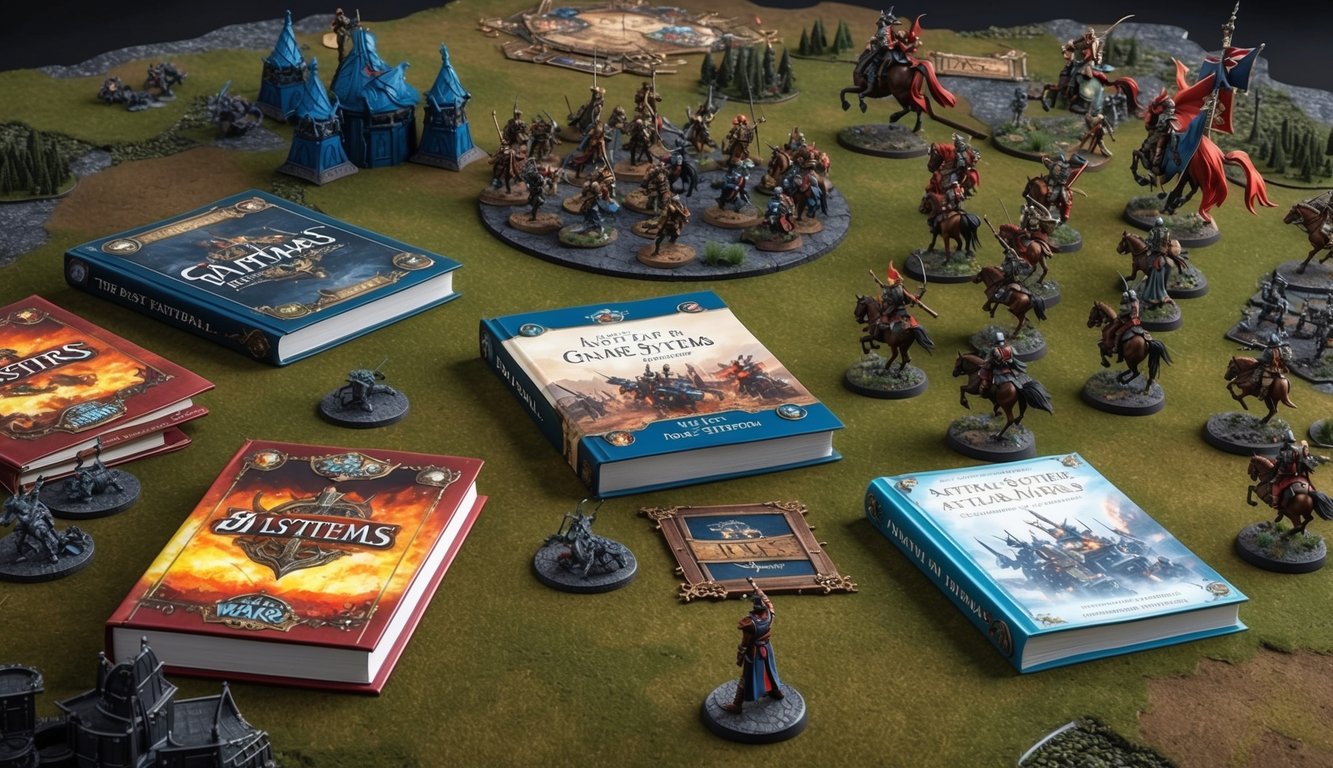
Fantasy war games offer diverse rule sets and mechanics to bring epic battles to life.
You’ll find intricate systems for customizing characters and unique ways to command your forces on the tabletop.
Character Customization and Advancement
In many fantasy war games, you can tailor your heroes and units to fit your playstyle.
You might choose from a range of races, classes, and skills to create unique characters.
As you play, your troops often gain experience and level up, unlocking new abilities or improving stats.
Some games use point-buy systems, letting you allocate resources to different attributes.
Others offer talent trees or skill paths for more structured progression.
You can often equip your units with various weapons and magical items, further personalizing your army.
Unique Command Systems
Command systems in fantasy war games can vary widely, adding strategic depth to your battles.
You might use activation tokens to determine turn order, or draw cards to represent battle plans.
Some games feature command points you spend to issue orders, while others rely on dice rolls to simulate the chaos of war.
You’ll often find mechanics for rallying troops, coordinating attacks, and managing morale.
Many games incorporate a “fog of war” element, limiting your knowledge of enemy positions or forcing you to make decisions with incomplete information.
These systems challenge you to think on your feet and adapt your strategy as the battle unfolds.
Strategies and Tactical Gameplay
Fantasy war games offer a variety of strategic elements to master.
You’ll need to balance empire management with clever battlefield tactics to achieve victory.
Empire and Army Building
Start by carefully selecting your faction based on their unique strengths and playstyle.
Focus on developing a strong economy early on to fund your war efforts.
Expand your territory strategically, securing key resources and defensible positions.
Build a diverse army composition to counter different enemy unit types.
Upgrade your troops and equipment regularly to stay competitive.
Don’t neglect city defenses – walls and defensive structures can buy you crucial time if attacked.
Consider diplomacy as another tool in your arsenal.
Form alliances when beneficial, but be prepared for potential betrayal.
Use spies to gather intelligence on enemy movements and strengths.
Using Magic and Special Abilities
Magic can be a game-changer on the battlefield.
Research powerful spells and artifacts to gain an edge over your opponents.
Some games let you recruit hero units with unique abilities – use these wisely to turn the tide of battle.
Understand the strengths and weaknesses of different magical schools.
Fire spells might deal heavy damage but have limited range, while illusion magic could confuse enemy units.
Time the use of special abilities for maximum impact.
A well-placed area-of-effect spell can decimate tightly packed troops.
Healing and buff spells can keep your forces fighting longer.
Don’t forget about terrain effects.
Certain spells or abilities might be more effective in specific environments.
A fireball spell could be devastating in a dry forest, while water magic excels near rivers or coastlines.
Factions and Races
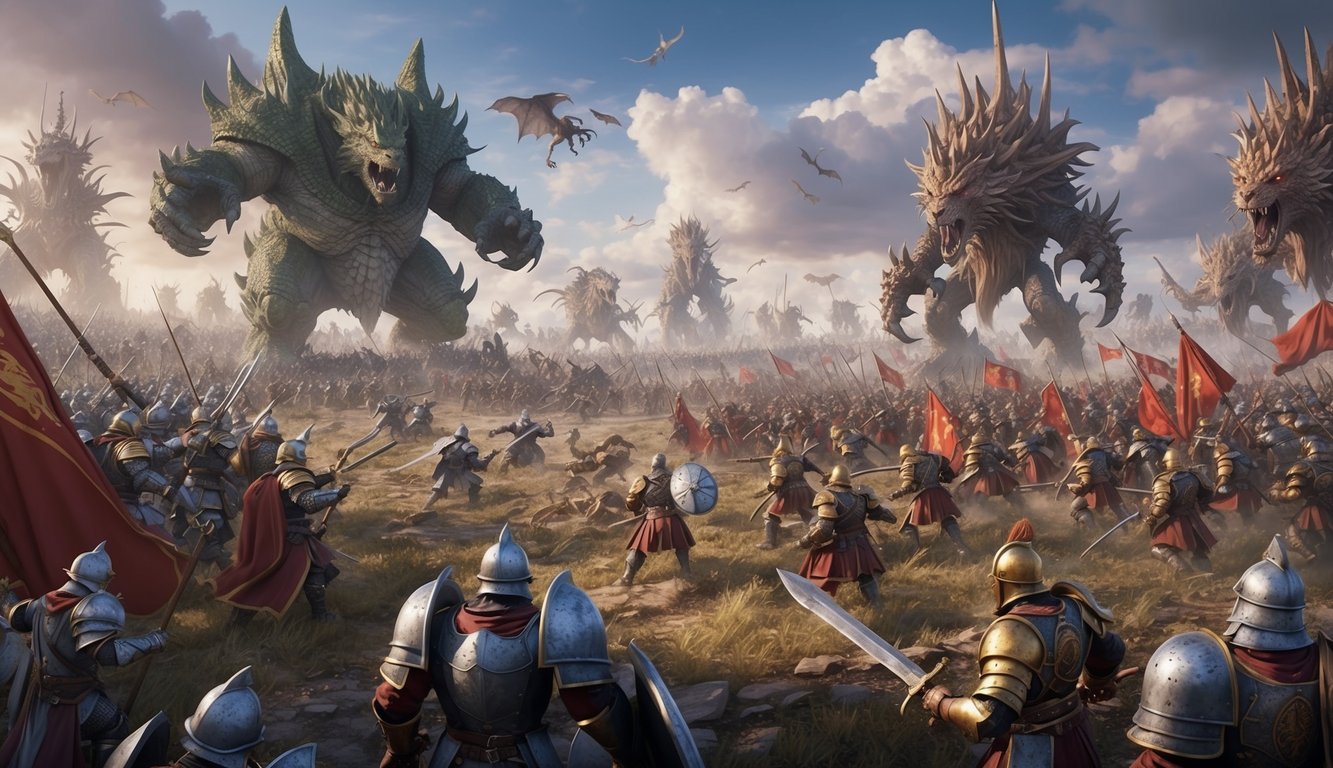
Fantasy war games offer a diverse array of factions and races to choose from.
You’ll encounter everything from noble human kingdoms to monstrous hordes of creatures.
Each group brings unique strengths, weaknesses, and playstyles to the battlefield.
Popular Clans and Armies
The Blood Angels stand out as a fan-favorite Space Marine chapter.
Known for their angelic aesthetics and brutal close combat skills, they’re a force to be reckoned with.
You might also find yourself drawn to the Chaos Daemons, embodiments of dark gods that spread corruption across the realms.
Don’t overlook the Skaven, a race of devious ratmen.
These sneaky creatures rely on sheer numbers and nasty tricks to overwhelm their foes.
Their contraptions range from plague-spewing catapults to lightning cannons.
Human factions often feature knights in shining armor or disciplined legions inspired by historical armies.
Elves typically excel at archery and magic, while dwarves bring sturdy infantry and powerful war machines to the table.
Monstrous and Mythical Beings
You’ll encounter a menagerie of fantastical creatures in these games.
Dragons soar through the skies, breathing fire upon hapless enemies below.
Giants lumber across battlefields, swatting aside entire units with massive clubs.
Undead armies march relentlessly, led by necromancers or vampires.
You might command legions of skeletons, zombies, and ethereal spirits.
On the other end of the spectrum, nature-aligned factions often field treemen, unicorns, and other mystical forest dwellers.
Demonic hordes can include everything from tiny imps to towering greater daemons.
These otherworldly beings usually have unique abilities tied to their patron god’s domain, like plague, excess, or change.
Notable Games and Series
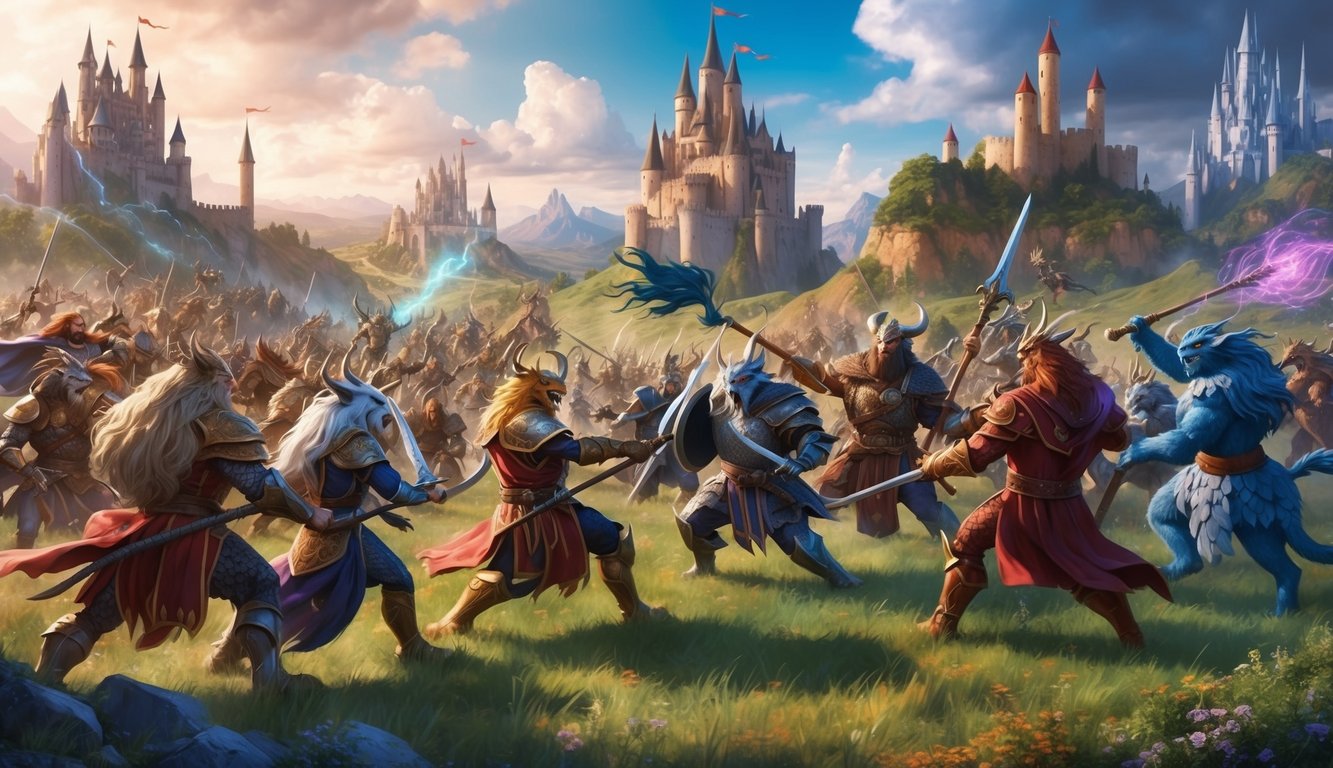
Fantasy war games offer epic battles and strategic depth in magical realms.
Some titles stand out for their immersive gameplay and rich lore, while others have shaped the genre itself.
Highlighting the Best Fantasy War Games
Warhammer Fantasy Battle reigns supreme in tabletop wargaming.
You’ll command armies of elves, dwarves, and monsters in massive conflicts.
For digital strategy, Dawn of War 2 brings the grim darkness of Warhammer 40,000 to life.
You’ll lead elite Space Marines against alien hordes in intense tactical combat.
Kings of War offers a streamlined fantasy battle experience.
You can field entire armies of mythical creatures in quick, decisive engagements.
If you prefer classic board games, HeroQuest lets you delve into dungeons as brave heroes facing evil minions.
Spotlight on Dungeons and Dragons
While not strictly a war game, Dungeons and Dragons has influenced countless fantasy strategy titles.
You create unique characters and embark on epic quests in richly imagined worlds.
D&D’s combat system forms the basis for many tactical RPGs and wargames.
The game’s expansive lore and creature designs have inspired numerous fantasy war games.
You’ll often find familiar monsters and magic spells adapted into other titles.
D&D’s focus on storytelling and roleplaying also enhances the narrative depth of many fantasy strategy games.
Community and Competitive Play
Fantasy war games thrive on player interaction and organized events.
You’ll find vibrant communities and exciting competitive scenes that bring the hobby to life beyond your gaming table.
Tournaments and Organized Play
Wargame tournaments offer you a chance to test your skills against other players.
Local game stores often host weekly or monthly events where you can bring your painted miniatures and show off your tactical prowess.
Larger conventions like AdeptiCon or NoVA Open draw players from around the world for massive competitions.
You’ll find different tournament formats to suit your style.
Some focus on painting and army composition, while others emphasize pure gameplay.
Many events use Swiss-style pairings to match you against opponents of similar skill levels.
Organized play programs, like those for Warhammer 40,000, provide structured campaigns and narrative events.
These let you participate in ongoing storylines and earn rewards for your armies.
The Social Aspect of Gaming
War games are as much about friendship as they are about battles.
Your local gaming group becomes a second family, sharing painting tips, swapping stories, and cheering each other on.
Online communities expand your circle even further.
Forums, social media groups, and Discord servers connect you with players worldwide.
You can share army lists, debate strategies, and arrange games with folks across the globe.
Painting nights and hobby workshops let you improve your skills while socializing.
There’s nothing quite like chatting with friends while working on your latest miniature masterpiece.
Integration of RPG Elements
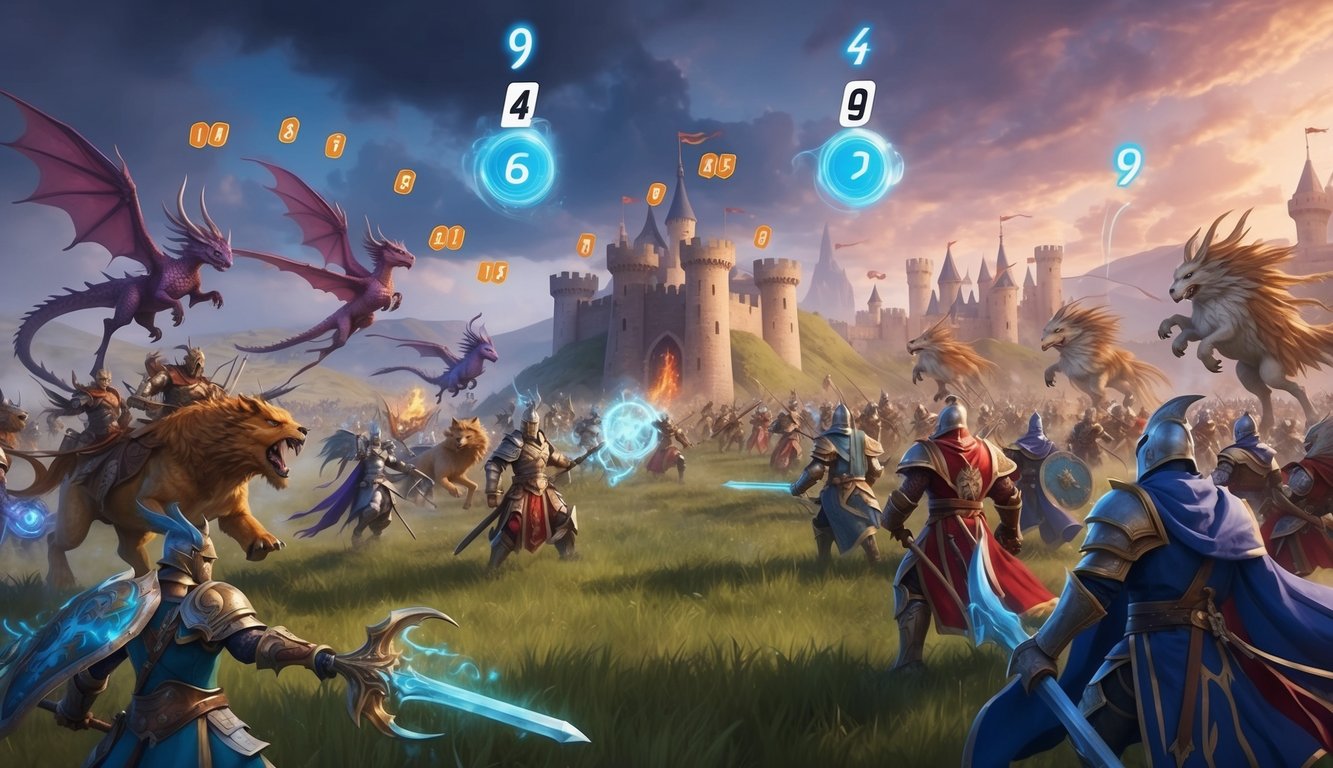
Fantasy war games have embraced RPG elements to create richer, more immersive experiences.
These additions bring depth to characters and gameplay, enhancing the strategic aspects with personal investment and progression.
Character Narratives and Quests
Many fantasy war games now feature fleshed-out characters with backstories and personal quests.
This approach, inspired by tabletop RPGs like Dungeons and Dragons, adds a layer of storytelling to your tactical decisions.
Your units aren’t just faceless soldiers; they’re individuals with motivations and goals.
In games like Final Fantasy Tactics, you follow the journey of Ramza and his allies through a complex political plot.
Each character’s story intertwines with the larger conflict, making your strategic choices feel more meaningful.
You might decide to take on side quests to learn more about a character’s past or to gain their loyalty, adding extra dimensions to your campaign.
Progression Systems and Rewards
RPG elements also shine in the way you develop your forces over time.
You’ll often find:
- Experience points and leveling systems
- Skill trees for customizing abilities
- Equipment upgrades and magical items
These systems give you a sense of growth and accomplishment as you play.
In Final Fantasy Tactics, you can train your units in different job classes, mixing and matching skills to create powerful combinations.
This level of customization lets you tailor your army to your playstyle.
Rewards become more than just territory or resources.
You might earn rare weapons, unlock powerful spells, or discover hidden character classes.
This progression keeps you engaged, always looking forward to the next upgrade or ability you can unlock for your troops.
Future of Fantasy War Games
Fantasy war games are poised for exciting developments in the coming years.
You can expect technological leaps and new features shaped by player feedback and industry trends.
Technological Advancements
Virtual reality (VR) is set to revolutionize how you experience fantasy battles.
Imagine standing on the battlefield, commanding your troops with hand gestures and voice commands.
Augmented reality (AR) could blend digital armies with your real environment, turning your living room into a war zone.
AI improvements will make your opponents smarter and more unpredictable.
You’ll face adaptive strategies that learn from your playstyle.
Procedurally generated maps and campaigns will offer endless replayability, ensuring no two battles are the same.
Cloud gaming might allow you to jump into massive multiplayer conflicts instantly, without needing a powerful gaming rig.
Cross-platform play could unite PC, console, and mobile gamers in epic wars across devices.
Community Predictions and Wishes
You’re likely eager for more historical-fantasy crossovers like Total War: Three Kingdoms.
Fans are buzzing about potential games set in mythical versions of ancient civilizations or alternate history scenarios.
Real-time strategy enthusiasts hope for a return to base-building and resource management, blended with fantasy elements.
You might see games that mix Civilization-style empire management with tactical fantasy battles.
There’s a growing demand for more diverse settings beyond the typical European medieval fantasy.
You could explore worlds inspired by African, Asian, or pre-Columbian American mythologies.
Multiplayer modes are evolving too.
You might soon participate in persistent online worlds where alliances and territories shift daily, or join in massive battles with hundreds of players controlling individual units.

